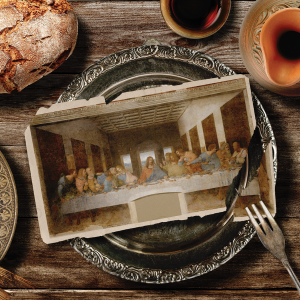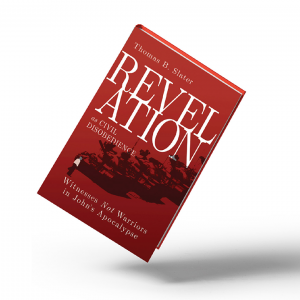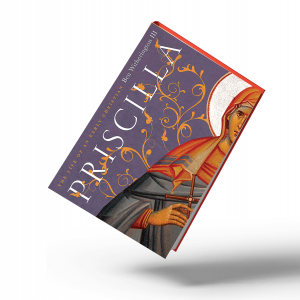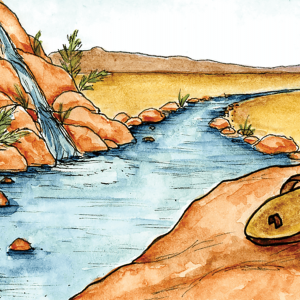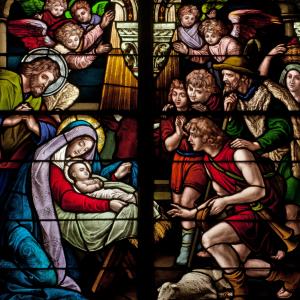
Reta Halteman Finger, a retired associate professor of New Testament and freelance writer, lives in Rockingham, Va.
Posts By This Author
Early Church Potlucks Were Surprisingly Subversive
A Bible study on wealth, class, and the Lord’s supper.
While they were eating, Jesus took a loaf of bread, and after blessing it, he broke it, gave it to the disciples, and said, “Take, eat; this is my body.” Then he took a cup, and after giving thanks, he gave it to them, saying, “Drink from it, all of you; for this is my blood of the covenant, which is poured out for many for the forgiveness of sins.”
— Matthew 26:26-28
CLIMBING ROCK HILLSIDES and wading across gurgling streams lined with thistles, a friend and I walked the Jesus Trail in Galilee a few years ago. After about 8 miles of vigorous hiking each day, the trail led to a hostel or home with a hot meal we shared with other travelers. Our common identification with Jesus on this journey from Nazareth to Capernaum made these bread-breaking events seem to us almost like a “Lord’s Supper”! We were strangers from different countries, but our hunger and our common passion for walking where Jesus walked drew us together.
If eating together helps create a bond between diverse people, what compelled the Apostle Paul to write these words to his house churches in the city of Corinth: “Now in the following instructions I do not commend you, because when you come together, it is not for the better but for the worse.” (1 Corinthians 11:17)?
How does eating a bread cube and drinking a swallow of juice with other church members make things worse in the congregation? What divisions are keeping people apart from each other? Let’s dig into the context.
Jesus Hiked
After walking the Jesus Trail, I'll never read the words “Jesus went” the same way again.
APRIL 2019. On the second day of our 65-kilometer walk on the Jesus Trail in Galilee, I began feeling dizzy and faint. Berry, my hiking partner, told me to drink more water. That helped, and we were able to make our way from Nazareth to our next stop in Cana, site of a wedding Jesus attended.
But the Jesus Trail continued, often on narrow stony paths speckled with animal droppings, up and down hillsides, across streams of springtime water where thistles grew over our heads, through meadows of waist-high grasses, and finally up and over Mount Arbel leading down to the Sea of Galilee. Our destination was Capernaum, site of Jesus’ headquarters during his ministry.
Exhausted at the end of our hike and with blistered feet, I turned to Mark’s gospel. Already in 1:21, Jesus “went to Capernaum”; the next morning he “went to a deserted place to pray” (verse 35). Then he “went throughout Galilee, proclaiming the message” (verse 39). I will never read the words, “Jesus went” the same way again. Not by horse, carriage, automobile, train, or plane. Not communicating by telegram, radio, phone, email, YouTube, or Zoom. Just trudging by dusty, sandaled feet, bereft of Nikes!
‘Lords of the world’
SINCE THAT HIKE, I have been pondering the Incarnation. Was it necessary for the Infinite One to go that far down? To be born a lower-class, brown-skinned, black-haired Middle Eastern Jew whose only means of transport was by scratched and calloused feet? To live under an enemy occupation determined to keep its subjects poor and politically powerless?
Pay Attention, Men: Jesus Embodies “Lady Wisdom”
A Bible study on Matthew 11.
I WAS CALLED “John the Baptist” because of that great revival movement we had down by the Jordan River. We were all so hopeful then, especially after my cousin Jesus showed up. I suspected he was The One to save our people, even after he asked me to baptize him. But when I heard that heavenly voice announcing, “This is my Son,” I knew. Judgment was coming! Jesus would know how to separate the wheat from the chaff and burn the chaff with unquenchable fire (Matthew 3:11-17)!
I was on a roll. We Jews would live by Yahweh’s law, Rome’s yoke would be cast off, and everything would change. I kept preaching and baptizing, and I even chastised Herod Antipas for his unlawful marriage (Mark 6:17-18), confident he was part of the “chaff.” Jesus was our Messiah, the Anointed One of Israel—and I had been his forerunner (Matthew 3:2-3). Yet here I am—chained to a wall in Herod’s dreary prison cell. What went wrong?
I assumed Jesus would gather and train disciples to prepare for a revolution. But rumors from my own disciples tell me this is not happening. He’s sending them out on missions to Jews, but not as I expected. They don’t even carry a backpack or a staff. Their only weapon is against physical diseases. And their promised rewards are arrests, floggings, and trials (Matthew 10:1-25). This sounds like a parody of what I was hoping for! Jesus acts more like a teacher and healer—even a prophet—but not like a king, not like an anointed Messiah!
Is the Book of Revelation a Guide to Civil Disobedience?
Thomas B. Slater's volume is not a typical commentary.
JOHN LEWIS died the week I read this book. No American alive in 2020 was a better witness to the courage of nonviolent civil disobedience than Lewis. Ironically, that same week “warriors” from the federal government descended, uninvited and unidentified, on Portland, Ore. Violence exploded. The Bible’s final book, Revelation, seems more relevant than ever.
Thomas B. Slater’s slim volume is not a typical commentary on the biblical book, analyzing all its chapters and decoding all its symbols. Instead, Slater focuses on the political situation of seven small house churches in Roman-dominated Asia Minor (now western Turkey), to whom John of Ephesus wrote (Revelation 2-3). These believers lived in cities where temples or shrines represented the imperial cult, and all subjects were expected to offer sacrifices to the current “divine” emperor.
The First Century Church According to a Forgotten Female Leader
A review of “Priscilla: The Life of an Early Christian,” by Ben Witherington III.
THE NOVEL BEGINS with a nightmare from the 10th year of Nero’s reign, 64 C.E. “Rome was burning, would not stop burning ... the screams of adults and children, burning.”
Priscilla, or Prisca, is just waking up from a bad dream. An early Christian believer from “Roma,” wife of Aquila, a leatherworker like “Paulus,” and a house church leader (Acts 18:18-28; Romans 16:3-5; 1 Corinthians 16:19), Prisca is now a widow with an adopted daughter. The nightmare encourages her to record her life story.
Author Ben Witherington III is a professor of New Testament at Asbury Theological Seminary and a prolific writer. With his imagination, New Testament mentions of Prisca, and knowledge of the culture and politics of the Roman Empire, Witherington creates a dramatic account of the first century church, as told by an early leader.
He first portrays Prisca as a young freedwoman adopted by her childless mistress. She is named Priscilla after her adoptive mother and given Roman citizenship. The elder Priscilla was a Jewish adherent, so devout that she traveled to Jerusalem for the feast of Shavuot (in Greek, “Pentecost”), taking her adopted teenage daughter with her. By coincidence, the festival that year ushered in the descent of the Spirit and the birth of the church. Thus Prisca became part of the Jesus movement from the beginning.
Resurrection Isn’t Just Spiritual
Reflections on the Revised Common Lectionary, Cycle A.
OUR LECTIONARY REFLECTIONS for April encompass Palm Sunday and three weeks of readings for Easter. I found these scriptures deeply moving as they presented Jesus of Nazareth through different eyes and in different contexts.
One spring many years ago, our small Mennonite church near Chicago centered our worship services from Easter to Pentecost on stories of Jesus’ resurrection. It was my first experience of “Eastertide,” and I never forgot it. Each week we focused on a different resurrection account in the New Testament—one from each gospel (two from Luke) and 1 Corinthians 15. Comparing different perspectives, our services highlighted the many witnesses to a singular, unexpected event that can help convince us today that this crucified prophet has been resurrected and exalted as Messiah and Lord (see Philippians 2:9-11).
Two more thoughts: First, in the passages below we unfortunately miss the terrifying events after Palm Sunday, during which Jesus confronts the Powers—both high-priestly and Roman—that want to get rid of this “King of the Jews.” Jesus was crucified as a political threat. To accept the risen Jesus as Lord is to take on the (often political) struggle between good and evil in our current contexts.
Second, our faith is not just spiritual. Jesus’ bodily resurrection speaks of the value God places on physical bodies. Though Jesus was black-haired and brown-skinned, God loves all shades and shapes of bodies. Through Jesus’ resurrection, we catch a glimpse of the age to come. It may indeed be, as C.S. Lewis characterizes the new Narnia, deeper and more solid than our present age.
April 5
A Risky Donkey Ride
Isaiah 50:4-9; Psalm 118:1-2, 19-29; Philippians 2:5-11; Matthew 21:1-11
ABOUT 40 YEARS after the original “Palm Sunday” in Jerusalem, the Jewish historian Josephus wrote a history called The Wars of the Jews. In it, he described the welcome received by the Roman Emperor Vespasian when he returned to Rome after destroying Jerusalem and its temple.
The Romans were so fired up that many exited the city to meet him: “The whole multitude ... came into the road and waited for him there.” With great joy, “they styled him their Benefactor and Savior.”
In contrast, Jesus’ “triumphal entry” into Jerusalem parodies the ancient tradition of a victorious king welcomed home to his city after a battle. Rather than riding a white horse, the Middle Eastern Jesus borrows a donkey (Matthew 21:2). Although a large crowd of outsiders created a path for him with cloaks and branches, Jerusalem’s citizens have one startled response: “Who is this?” (verses 8, 10). But even his followers do not call him a king; he is “the prophet Jesus from Nazareth in Galilee” (verse 11).
Rather than a victorious welcome such as Vespasian received, Jesus knows he is raising the stakes in a land as sharply divided as our own. He must nonviolently challenge the corruption that lies at the core of its leadership—Caiaphas and other chief priests who negotiate with Rome for their own interests. Jesus of Nazareth knows his dramatic action will likely result in his execution, but to honor God, he must take the risk.
Only after these Jerusalem events can the “daughter of Zion” go back to her scriptures and find texts such as Zechariah 9:9 where “your king is coming to you, humble, and mounted on a donkey” (Matthew 21:5). Or the song of victory in Psalm 118: “Blessed is the one who comes in the name of the Lord ... bind the festal procession with branches!” (verses 26-27).
Later believers can sing a hymn to their Messiah Jesus (in Philippians 2:6-11), who had “humbled himself to the point of death” and then became exalted above every other human as Lord.
Thirsty Land, Thirsty People
Reflections on the Revised Common Lectionary, Cycle A.
ON THE CHURCH calendar, the entire month of March is devoted to Lent—a period of self-examination as we follow Jesus on his journey to Jerusalem to confront the powers who have usurped Yahweh’s temple for their own purposes. Examining our own motives and desires, our private resentments and need for control, is one of the hardest tasks we can ever do. But there is no better time than Lent to deal with our own egos as honestly as possible. Time and time again I hear of family members or friends who are estranged from each other over money matters or misunderstandings. It reminds me of C.S. Lewis’ story The Great Divorce, when various characters would rather take the bus back to hell than reconcile with a brother or sister.
Besides interpersonal relationships, there are societal sins in which we participate. What is our responsibility to the community in which we live? What policies would best help the homeless or relieve unnecessary cruelty in the criminal justice system? How much should we change our lifestyles because of impending climate change? How does love of money and power affect our relationship with Jesus who laid them aside to identify with “the least of these”? Our lectionary readings for this Lenten period of self-examination range across both testaments and different genres of literature. References to sin and law are prominent—but so are the antidotes: confession, repentance, forgiveness, and grace.
March 1
Repentance Is Hard
Genesis 2:15-17; 3:1-7; Psalm 32; Romans 5:12-19; Matthew 4:1-11
TEMPTATION, SIN, CONFESSION, repentance, and forgiveness—or resisting temptation from the start? For those who engage Lent as a time of self-examination, these readings provide two examples, one from each testament. Psalm 32, attributed to King David, most likely refers to his own sins of adultery and murder. But after David repented and experienced forgiveness, he was able to eloquently express both the misery of the conviction of sin, and the rush of relief and wild joy that accompanied confession and repentance. You would think people would try repenting more often.
In Matthew 4:1-11, we learn that even the most intense temptations were resisted by Jesus, the “Son of David.” In the wilderness, Jesus confronted the voices within. “Use your power for yourself!” the tempter urged. “Change these stones into bread—like Yahweh made manna in the desert!” “Show your power to those big shots in Jerusalem! Then come up the mountain, and I will show you all the kingdoms of the world. They can all be yours ... if you worship me.” Don’t think the human Son of David did not struggle hard against these thoughts. At that very moment, Roman soldiers were occupying his land. What aspiring king, president, or politician could have turned down such an offer?
Truly repenting of sin is hard. Resisting temptation is hard. When have you repented of a sinful act and found forgiveness? When have you found the support—of friends or angels—to resist temptation?
Christians in Post-Castro Cuba
Some churches have embraced Cuba's revolutionary socialism more than others.
IN MARCH, I visited Cuba on a 10-day tour with alumni from Eastern Mennonite University. I’ve studied the socialist structure of the early Jerusalem church (as recounted in Acts 2-6), and I wanted to experience Cuban socialism directly and see how it compares. How, for example, have Christian churches fared under a one-party socialist government?
On our visit, we heard about Cuba’s successes in the areas of health care and education. We heard a lecture on the massive effort to bring Cuba’s average level of education from third grade in 1959 to the current 11th grade. We learned about Cuba’s universal free health care, and that local clinics throughout the island provide basic care accessible to every citizen. As a result, infant mortality is lower than in the U.S. and overall life expectancy is about the same, according to The Atlantic—even though the U.S. spends more than 10 times as much per person per year on health care.
Such basic needs have been met not by Christian churches but by a government that initially robbed the wealthy and shared it with the poor. What were Christians in Cuba—Catholics, Protestants, Anabaptists, and Jehovah’s Witnesses—to make of this enormous shift toward economic equality? After the revolution, most missionaries returned to their home countries, and thousands of Cubans, Christians and otherwise, fled to the United States. Christians who remained had to rethink their mission in a society where the poor were educated and healed through structural change rather than individual charity.
Mary's Role Models
Heroic women in the Bible likely had a strong effect on Mary - and on Jesus.
DID MARY KNOW, on that puzzling and fateful afternoon when the angel Gabriel visited her, that she was about to join a line of mothers in Israel who would be remembered and honored within a tradition dominated by men?
Did she think of her forebear and namesake, Miriam, co-deliverer of her people from Egyptian slavery? Did Deborah, prophet and judge, come to mind—or Jael, the housewife who drove a tent peg into the brain of an enemy general? Had anyone told this nonliterate young woman about Huldah, the prophet and scholar who identified Deuteronomy as sacred scripture? Surely Queen Esther, who saved her people from a Persian pogrom, was known to Mary from the annual festival of Purim.
More likely Mary would have remembered women in Israel who gave birth to important men, such as Samson and Samuel. The late pregnancy of her cousin Elizabeth brought Isaac’s mother, Sarah, into view.
But her own premarital pregnancy may have reminded her more of Bathsheba, mother of Solomon. In this patriarchal culture, wives who could not conceive were disgraced and considered of little worth, but pregnancy before marriage could result in an honor killing. No wonder Mary fled to Elizabeth as the only person who might understand her unusual plight (Luke 1:39-45). Guided by the Holy Spirit, Elizabeth enabled Mary to turn her fear into a song of praise adapted from Hannah’s prayer after her son Samuel was born (Luke 1:46-56; 1 Samuel 2:1-10). God lifts up the lowly and brings down the proud.
If she pondered her place in Israelite history, did Mary also think of more-recent heroes? If Hanukkah was celebrated in Nazareth each year, she would have known how the second temple in Jerusalem had been rededicated to Yahweh after its desecration by the Seleucid ruler Antiochus IV, 160 years earlier. Hanukkah acclaimed the successful Maccabean revolt and subsequent Judean independence; it also exalted Judith, whose name means “Jewish woman”; she saved Israel from destruction by beheading the Assyrian general Holofernes.
Jesus Confronts ‘Alternative Facts’
"What is truth?" Pontius Pilate asked Jesus. It's an important question.
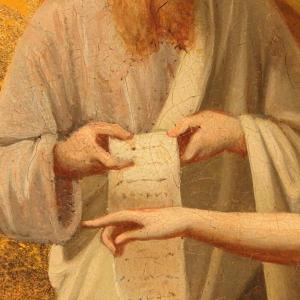
Détail de Pilate et des accusateurs/ Pethrus / CC BY-SA 3.0
LONG AGO AND FAR AWAY, a prisoner under arrest for treason faced his judge. The judge asked him about his beliefs and his political aspirations. “You can accuse me of wanting to be a ruler,” the prisoner replied, “but all I can say is that I came into this world to testify to the truth.” The judge was deeply scornful. “What is truth?” he said, and turned on his heel and walked away.
If you were working for a great empire, as was this judge and governor, you would be far more concerned about power than about truth. In fact, later in the trial, the judge reminded his prisoner that he had the power to release or execute him. The judge cared more about enhancing his own power and reputation in the empire than about meting out justice. The life of a powerless prisoner, along with the concept of truth, was expendable.
Today, truth itself may be expendable in the United States. A few years ago, comedian Stephen Colbert coined the word “truthiness” to describe that reality. But in the power struggle of our recent presidential election and the resulting shift in leadership, truth is becoming more and more squishy. Thus the Oxford English Dictionary added a stronger word in 2016: “post-truth,” defined as “relating to or denoting circumstances in which objective facts are less influential in shaping public opinion than appeals to emotion and personal belief.” As Oxford’s usage example puts it, “in this era of post-truth politics, it’s easy to cherry-pick data and come to whatever conclusion you desire.” No doubt the fake news we have seen and heard on social media is sure to continue.
The Political Drama of Revelation
The last book of the Bible has more shocking twists than 'House of Cards.'
WHEN I ASKED various Christians about their reaction to the book of Revelation, I heard back: “Dark and scary.” “It’s too violent for me.” and “It’s a total blank. I really don’t know anything about it.”
But this dramatic, political, incendiary scripture is important for us to understand today. It was written in empire and should be read today in our own imperial context to learn what it means to follow the Lamb. We also need to know how it has been used and misused by Christians throughout history. As evangelical New Testament scholar Gordon Fee says, “To understand what a text means, we must first understand what it meant!”
Reading the apocalypse
First, a bit of background. The word “revelation” (apokalupsis in Greek) belongs to a popular genre of Jewish literature prevalent from about 250 B.C.E. to 200 C.E. An apocalypse purports to be a vision of a realm beyond our normal senses, where God is in control and will eventually break in to rescue the faithful from oppression. Apocalyptic literature is intended to bring hope during times of political uncertainty or persecution.
The books of Daniel and Revelation are our only canonical examples of apocalyptic literature. Other Jewish apocalypses written during this period are attributed to heroes of old, such as Adam, Enoch, and Abraham, to lend authority. Daniel also is pseudonymous, since Daniel lived 400 years before the second-century B.C.E. events described in chapters 7 to 12 of that book.
Only John in Revelation uses his own name and his own location: “I, John, your brother who shares with you in Jesus the persecution and the kingdom and the patient endurance, was on the island called Patmos because of the word of God and the testimony of Jesus” (1:9). He is in political exile on Patmos, off the coast of Asia Minor (now Turkey), because of his witness to the good news of Jesus.
Not a Needy Person Among Them
Members of the early church shared everything they had 'in common.' Is there a lesson in that for us today?

Derek Hatfield / Shutterstock
AN UNUSUAL TITLE recently caught my eye at the library. The book is called The Moral Molecule: How Trust Works, by Paul J. Zak. An economist with obvious interests in biology, psychology, and religion, Zak’s numerous experiments demonstrate that when someone is shown a sign of trust or when one’s empathy is engaged, a certain molecule called oxytocin surges in the brain and blood.
“When oxytocin surges,” says Zak, “people behave in ways that are kinder, more generous, more cooperative, and more caring.” In other words, they follow the Golden Rule of treating others as you want to be treated. Zak eventually demonstrates how oxytocin can work within economic systems, which reminded me of a children’s song we sang at a church I used to attend in Chicago: “Love is like a magic penny. Hold it tight and you won’t have any. Lend it, spend it, and you’ll have so many they’ll fall all over the floor!”
And that reminded me of research I had done on the early Jerusalem church in the book of Acts. If there ever were oxytocin surges, it must have been at Pentecost and in the days and years of the shared economic community that followed!
Two summary texts describe the common life shared among these earliest believers: Acts 2:44-47 and 4:32-37. The first tells of their daily life together, distributing possessions, worshiping in the temple, and eating a daily communal meal in various households. The second passage describes the renunciation of private ownership. Believers sold their land and homes and gave the money to the community to be distributed “as any had need” (4:35).
Why did they do this? Wasn’t it impractical and more trouble than it was worth? Didn’t they soon have to cope with cheaters like Ananias and Sapphira (5:1-11) or complaints from Hellenist widows (6:1-6)? Didn’t that radical idealism soon peter out and people go back to their former lifestyles?
Interpreting through middle-class mirrors
My research on how these economic texts have been interpreted throughout Christian history was eye-opening. Ever since market capitalism arose in the 14th century, many commentators considered the communalism of the Jerusalem church to be unrealistic. For example, John Calvin, a 16th century community organizer, writes in his Acts commentary that he had to “properly” interpret communal sharing in 2:44 “on account of fanatical spirits who devise a koinonia of goods where all civil order is overturned.” He especially criticizes the Anabaptists of the time, because “they thought there was no church unless all mens’ (sic) goods were heaped up together, and everyone took therefrom as they chose.” Instead, Calvin recommends that “common sharing ... must be held in check.”
The rise of historical criticism during the 19th century in the West led to much skepticism about the accuracy of biblical texts. Luke wrote decades later, scholars asserted, idealizing the early church in Acts. The Jerusalem believers were very poor and had to help each other out, so Luke turns this grim picture into a Golden Age of sharing. In his 1854 commentary, Edward Zeller maintained that Acts 1 to 7 was full of legends and fictitious stories that Luke himself created.
The conservative reaction to such skepticism was to affirm the historicity of the early chapters of Acts—but to see this as a socialist experiment that soon failed and was never tried again. Its failure was confirmed by the poverty of the Jerusalem church in Acts 11:27-29, where the disciples at Antioch decided to “send relief to the believers living in Judea.”
No doubt these notions about the community of goods in Acts 2 to 6 prevail in many churches today. But both perspectives get it wrong because scholars and laypersons alike read these texts out of their own economic situation—Western capitalism. For middle and upper-middle classes (from which most biblical scholars emerge), capitalism has worked well. As a political and economic system, it has staunchly opposed Marxist and other ideas of socialist communalism, often perceived as “godless.”
This hostility has made it almost impossible to view the socialism of the early Jerusalem church as a positive development or one that survived more than a few years. For example, G.T. Stokes’ 1903 Acts commentary in the English Expositor’s Bible series declared that the Jerusalem experiment was a socio-economic disaster that should never have happened. One of the evils it produced, according to Stokes, was the conflict between the Hellenist and Hebrew widows in Acts 6:1. Stokes assumes they were destitute widows fighting over poor relief. Reflecting Victorian class distinctions and paternalistic attitudes, he asserts, “No classes are more suspicious and more quarrelsome than those who are in receipt of such assistance ... Managers of almshouses, asylums, and workhouses know this ... and ofttimes make bitter acquaintance with that evil spirit which burst forth even in the mother church of Jerusalem.”
Paul's Political Manifesto
The apostle's prison letter to the Philippians was a challenge to the Roman Empire - and to the U.S. empire as well.

alexsol / Shutterstock
“REJOICE IN THE LORD ALWAYS.” “Do not worry about anything.”
“I can do all things through Christ who strengthens me.”
Verse fragments such as these, in the midst of a warm, fuzzy letter the Apostle Paul wrote to the house churches in Philippi, sustained me through high school and beyond. Indeed, the entire letter is saturated with joy. Philippians has been a source of great comfort to many Christians over the centuries.
It is clear that Paul had a close friendship with the believers in Philippi. A major purpose of the letter was to thank them for sending one of their own, Epaphroditus, with a gift for Paul. Sadly, the messenger became very ill while with Paul, but now that he has recovered, Paul is returning him to Philippi, along with the letter (2:25-30; 4:15-18).
Less clear are the political assumptions and harsh realities that frame this encouraging missive. Paul lived and traveled within the mightiest empire the world had known up to that point. He carried his gospel message thousands of miles on Roman roads built for military conquest. At the same time he challenged the very foundations that supported this empire, and his activism was perceived by political authorities as a threat. Paul paid for this by suffering in a Roman prison (1:13) and did not know if he would survive his ordeal or not (1:21-24).
Jonah At Sea
The prophet who got everything wrong.
THE MORE I READ the story of Jonah nestled among the serious Minor Prophets of the Old Testament, the more fantastic and hilarious it gets. Everything is turned upside-down.
Jonah’s story follows Amos, who rips into rich people who “lie on beds of ivory and lounge on their couches.” It precedes Micah, whose Lord calls us “to do justice and to love kindness.” But Jonah spends his energy running away from Yahweh. In fact, Jonah is never even called a prophet in the book that bears his name. His interests and concerns are completely different from the Deity who has called him. Only entombment inside a “great fish” will drive his bedraggled, stinking self to the city that needs to repent. Even so, Jonah will perceive his surprising success as an utter failure.
But that’s getting ahead of the story. Most Hebrew prophetic books are collections of oracles unmoored to narrative, but Jonah’s tale has a setting, characters, and a plot! If you didn’t learn this in children’s Sunday school, here are the bare bones of the action:
Yahweh tells a man named Jonah to go east to the city of Nineveh to cry out against its evil. But Jonah flees in the opposite direction on a ship traveling west. A huge storm blows in, so when Jonah says it’s his fault, the sailors reluctantly throw him overboard. The storm immediately stops. A “great fish” swallows Jonah for three days and nights. Then God makes the fish vomit Jonah out on dry land.
In part two, Yahweh repeats his original imperative: Go to Nineveh and warn them of destruction. Jonah does so, expecting a fireball from heaven to burn the city to the ground. Instead, the king repents of his evil and asks all his subjects, as well as the animals, to demonstrate repentance by wearing sackcloth. So God changes God’s mind and does not destroy Nineveh. Jonah is angry because the Ninevites do not get what they deserve. He sulks under a bush God creates for him. The ensuing conversation underlines Jonah’s resistance to the merciful and loving character of Yahweh. The ending is ambiguous.
Testing Jesus
A foreign woman creates a scene in Tyre.
THE GOSPELS OF Mark and Matthew both include the story of a Gentile woman who begs a reluctant Jesus to heal her daughter (Mark 7:24-30 and Matthew 15:21-28).
I thought of these texts last fall while reading I Know Why the Caged Bird Sings, an autobiographical work of the acclaimed poet Maya Angelou, who died last year. Born in 1928, Angelou spent most of her childhood with her grandmother in small-town Stamps, Ark. After a few years of eating candy from her grandmother’s grocery store, Maya developed two cavities that, she writes, “were rotten to the gums.” However, the white dentist in Stamps did not take “Negro” patients, and the closest black dentist was 25 miles away.
For several days no aspirin touched the blinding pain, so her grandmother finally took her to the white dentist, determined to beg and plead for help. Her grandmother recounts the dentist’s final rejection in highly colorful language: “Said he’d rather put his hand in a dog’s mouth. … He said, ‘Annie, I done tole you, I ain’t gonna mess around in no niggah’s mouth.’”
We may recoil at such naked racism, but in the segregated Jim Crow South, this sentiment must have been typical. I can imagine white churchgoers reacting to this story by thinking, “The nerve of that woman begging help from a white dentist! She got what she deserved.”
On the Outskirts of Heaven
Reflections of the Revised Common Lectionary, Cycle B
THE LAST SUNDAY IN FEBRUARY is the first Sunday of Lent. We are asked to prepare for Lent by searching our souls and repenting of our misdeeds in order to walk with Jesus on his road to the cross. After writing the final reflections below, I felt unfinished. Repentance is easy to talk about but exceedingly hard to do. We justify and excuse our actions when we’ve hurt a friend or made a bad choice. It’s usually someone else’s fault anyhow—they started it!
The most striking example of human resistance to repentance I’ve ever read was in C.S. Lewis’ little book The Great Divorce. The “divorce” is the huge gap between heaven and hell. Hell is not fiery but filled with people who can’t get along with each other and keep moving further apart in the darkness. Eventually, a few make their way to a bus stop where they get a ride to the outskirts of heaven. There everyone is met by someone from their past they’d rather not meet, and who begs them to repent, make restitution, or whatever is necessary to enjoy a joyful eternity of loving relationships. For almost all of them, it’s not worth it. They fear losing the bit of ego they have left. They’d rather go back to hell than repent and be reconciled with someone they love to hate.
No wonder repenting is the first step to entering the kingdom of God!
Bright Morning Star A-Rising
Reflections of the Revised Common Lectionary, Cycle B
IF WE FOLLOWED the church calendar and celebrated Epiphany in January, we wouldn’t have to cram the wise men into the crèche to compete with the shepherds. We could save all the “Star of Bethlehem” songs to brighten the cold days of January. Obviously, the magi needed a few weeks to prepare and then travel “from the East.”
A new bright object in the sky was certainly an “epiphany,” but it was not totally unexpected. These magi were astrologers, the ancient astronomers of their day. To the east of Jerusalem lay Babylon, birthplace of astrology and location of a large Jewish community. The discovery of two astrological books among the Dead Sea scrolls showed that the sign of Aries the Ram in the zodiac represented the reign of Herod the Great in Judea. Since Herod was aging, it is not surprising that Jewish astrologers were watching this royal constellation.
In a television series called Jesus: The Complete Story, astronomer Michael R. Molnar notes an unusual astrological conjunction on the night of April 17, in 6 B.C.E., the year Jesus was most likely born. At that time, both Saturn and the sun were in the constellation Aries, and then the moon eclipsed to reveal Jupiter, king of the planets, also in Aries. Jupiter shone into the dawn, another auspicious sign of royalty. It was confirmation enough to send these astrologers on their way.
Perhaps if we celebrated Epiphany after Christmas, we’d have more time to learn about this epiphany and its remarkable interpretation.
To the Millennia and Beyond!
Reflections on the Revised Common Lectionary, Cycle B
I CONFESS THAT I do not often use the Revised Common Lectionary. As a Bible professor, I prefer to read texts in their larger literary and historical contexts. When a brief reading from one time period is lifted out of its context and juxtaposed with another written many centuries later, it can feel like an invisible hand is forcing me to compare apples and oranges—or even apples and mushrooms.
Nevertheless, I have been enriched by this year’s readings for Advent and Christmas. My “larger historical context” has become the sweep of a thousand years of Israelite history, from King David to the birth of the “son of David.”
For Christians, the coming of Jesus was a singularity. Though we focus on his birth in this season, that lower-class event was barely noticed at the time, and it is not mentioned by two of our gospel writers. It is his entire life, ministry, death, and resurrection that echoes throughout the ages and ushers in our hope of salvation. Our prophets and psalmists from the Hebrew Bible could not foresee details of the Christ-event from their perspectives centuries earlier. Yet their intuitions and hints and poetic expressions of joy over God’s in-breaking from their times are now borrowed to give voice to our exultation over Jesus’ coming today.
In a culture measured by quarterly profits and immediate gratification by credit card, we need a longer view to better understand what God is doing throughout human history. These Advent readings call us beyond the present to the millennia of the past and the hope of the future stretching to eternity.
'What is to prevent me from being baptized?'
Philip's encounter with the Ethiopian eunuch: A Bible study
LUKE'S SECOND VOLUME, the Acts of the Apostles, tells the story of what happened to Jesus’ followers after they received spiritual power to be his witnesses “in Jerusalem, in all Judea and Samaria, and to the ends of the earth” (Acts 1:8).
Beginning in Jerusalem, the movement proceeds north and west, eventually tracing Paul’s journey to Rome. But the plot takes one big detour along the way, heading south to the mysterious lands beyond Egypt, carried by a person more foreign and unusual than any other in Luke’s vast cast of characters. Only divine intervention orchestrates the encounter between the Jewish Hellenist Philip and the Ethiopian eunuch in Acts 8:26-40.
What is the main thrust of this missionary story? Is it geography—a foray into “the ends of the earth” long before Paul reaches Rome? Is it religious ethnicity—the first God-fearing Gentile believer converting, even before the Roman centurion Cornelius? Is it the man’s undeniable African origins—straight from the lands of Nubia and Cush? Is it his wealth and connections to royalty that will enable him to bring Jesus’ gospel to Africa?
Luke likely included this story for all these reasons, but the text itself points over and over to what must be the driving force of Luke’s inclusive theology in this account—the rider in the chariot is not referred to by Luke as a man. Luke calls him a “court official” and a eunuch (8:27), and later calls him a eunuch four more times, but never a “man.” He has been castrated before puberty and trained to take sensitive positions not entrusted to males. He is beardless with a higher voice. Torn from his birth family and enslaved at a young age, he has no family of his own. Loyal only to his queen, he is “in charge of her entire treasury.”
